Skip to comments.
Polish Christmas Customs (see pictures, listen to carols)
Polish American Center.org (and others) ^
Posted on 12/23/2006 7:49:00 AM PST by lizol
Wigilia
Wesolych Swiat Bozego Narodzenia! That is the way to say "Merry Christmas" in Polish. Among Poles, wherever they are, the most beloved and beautiful of all traditional festivities is that of Christmas Eve. It is then that the Wigilia, or Christmas Eve Dinner is served. It is a solemnly celebrated occasion and arouses deep feelings of kinship among family members.
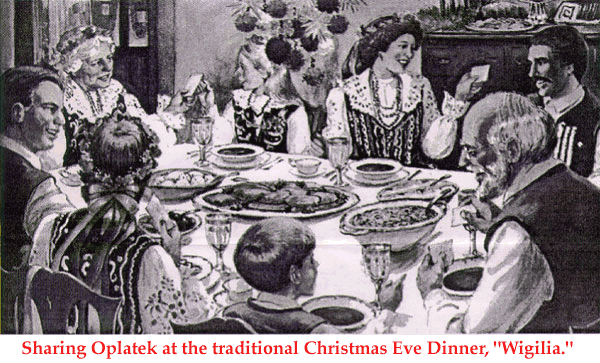
For days in advance, Poles prepare the traditional foods and everyone anxiously awaits the moment when the first star, known as the Gwiazdka, appears in the eastern sky. For that is when the feast to commemorate the birth of the Christ Child begins.
There is always a thin layer of hay under the white tablecloth in memory of the Godchild in the manger. Before sitting down at the table, everyone breaks the traditional wafer, or Oplatek and exchanges good wishes for health, wealth and happiness in the New Year. This is such a deeply moving moment that often tears of love and joy are evoked from the family members who are breaking this symbolic bread. The Oplatek is a thin, unleavened wafer similar to the altar bread in the Roman Catholic Church. It is stamped with the figures of the Godchild, the blessed Mary, and the holy angels. The wafer is known as the bread of love and is often sent by mail to the absent members of the family.
The dinner itself differs from other evening meals in that the number of courses is fixed at seven, nine or eleven. According to myth, in no case must there be an odd number of people at the table, otherwise it is said that some of the feasters would not live to see another Christmas. A lighted candle in the windows symbolizes the hope that the Godchild, in the form of a stranger, may come to share the Wigilia and an extra place is set at the table for the unexpected guest. This belief stems from the ancient Polish adage, "A guest in the home is God in the home."
The Wigilia is a meatless meal, no doubt the result of a long-time Church mandate that a strict fast and abstinence be observed on this day before Christmas. Although the Church laws have been revised and permit meat to be eaten on this day, the traditional meal remains meatless. Items that would normally be included in a traditional Wigilia menu include mushroom soup, boiled potatoes (kartofle), pickled herring (sledzie), fried fish, pierogi, beans and sauerkraut (groch i kapusta), a dried fruit compote, babka, platek, assorted pastries, nuts and candies.
After the meal the members of the family sing Polish Christmas Carols called the koledy while the children wait impatiently around the Christmas tree or choinka for the gifts to be exchanged.
Aside from the beautiful Wigilia, the Polish people have a number of other traditions that they practice throughout the Christmas season. Polish Christmas Carols or koledy are numerous and beautiful, especially when sung in Polish parishes at the Christmas Eve Mass. This Mass is called the Pasterka, which means the Shepherds Watch, and there is popular belief in Poland that while the congregation is praying, peace descends on the snow-clad, sleeping earth and that during that holy night, the humble companions of men - the domestic animals - assume voices. But only the innocent of heart may hear them.
Christmas Day itself is spent in rest, prayer, and visits to various members of the family. In Poland, from Christmas Day until the twelfth night, boys trudge from village to village with an illuminated star and a ranting King Herod among them to sing carols. Sometimes, they penetrate the towns in expectation of more generous gifts. In some districts, the boys carry on puppet shows called shopky. These are built like a little house with two towers, open in the front where a small crib is set.
During the Christmas season, the theaters give special performances. On the feast of the Epiphany, the priest and the organist visit the homes, bless them and write over their doors the initials of the three wise men - KMB (Kasper, Melchior and Balthazar) - in the belief that this will spare the homes from misfortune.
The Christmas season closes on February 2, known as Candlemas Day. On that day, people carry candles to church and have them blessed for use in their homes during storms, sickness and death.
Wesolych Swiat, Bozego Narodzenia i Szczesliwego Nowego Roku!
The Meaning of Oplatki (Christmas Wafers)
The celebration of Christmas by American families is enriched spiritually when time honored "old country" traditional customs are adopted. These practices serve to downplay the secular emphasis that has made of this holy time more of a "sell-ebration". These customs reemphasize what this great celebration is all about - the proclamation of the "good news" for all humankind of our redemption.
An especially popular custom is the sharing of the "Oplatek" or Christmas wafer, also known as "Anielski Chleb" or Angel Bread.
For the people of Poland and other Western Slavonic nations the "Oplatek" has always had a mystical quality.
The "Oplatek" is much like the unleavened wheat hosts used at Mass. Different Christmas scenes are embossed in the baking process.
For Americans, the "Oplatek" represents a reverent tie to the customs of "the old country." The observance that takes place on Christmas Eve becomes a sign of unity and solidarity with all members of the family, neighbors, and friends. Even absent members of the family receive an "Oplatek" by mail as a sign of their communion with their loved ones at home.
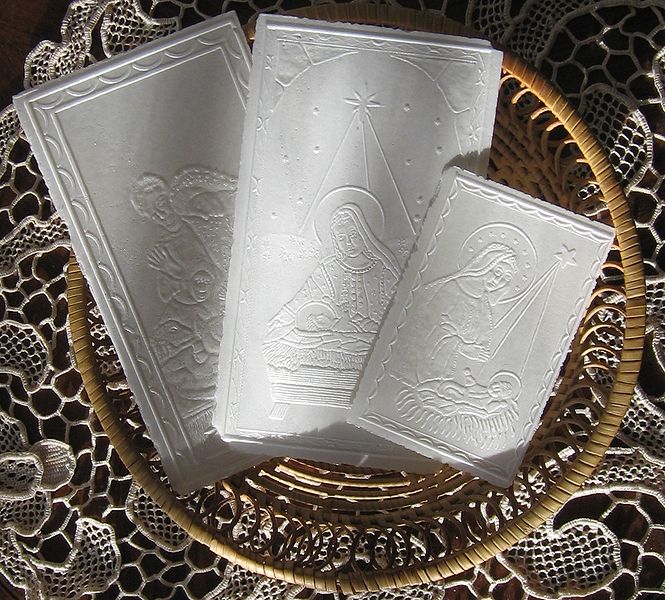
"THE FESTIVAL OF STARS "
On Christmas Day the village streets are traversed by boys and girls singing carols, and carrying " SZOPKAS "— miniature stages telling the Nativity story.
Other boys, dressed in costumes depicting King Herod, Death, a Devil, an Angel, a Bishop, and strange beasts, are led by a Star Boy. The " Festival of the STAR " is brought to a close on January 6th, Three Kings Day, or in some regions of Poland on Candlemass Day, February 2nd.
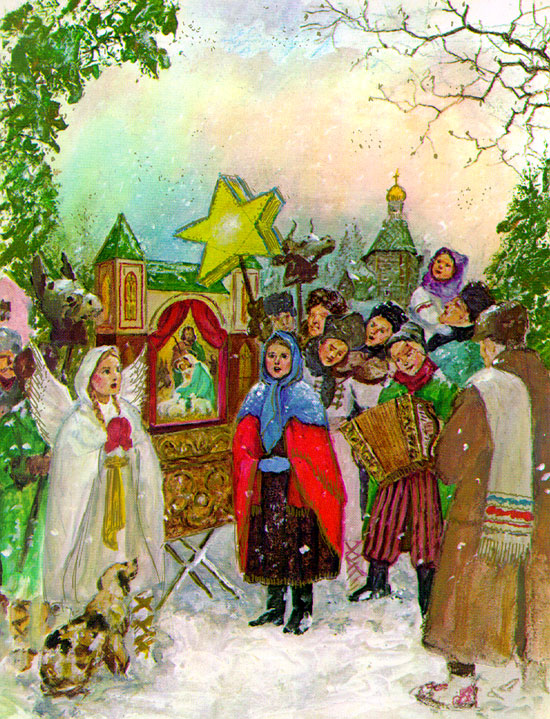











"Szopki"
A long-time tradition in Poland during the Christmas season is th building of "Szopki" (pronounced shop-key), which are elaborate form of the Nativity scene. This tradition started back in the 13th century in Krakow, Poland, and remains an annual tradition whereas major prizes are awarded for the most elaborately decorated and designed Szopki.
This is a miniature version of a Christmas Szopka. The Krakowian creches sometimes reach six feet in height. Their construction is based on elements of Krakow's historic architecture including Gothic spires, Renaissance facades and Baroquian-topped domes.


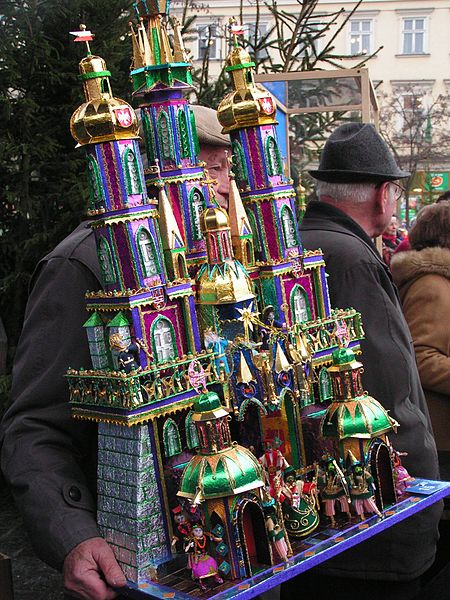

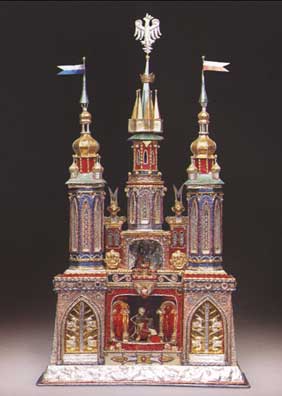
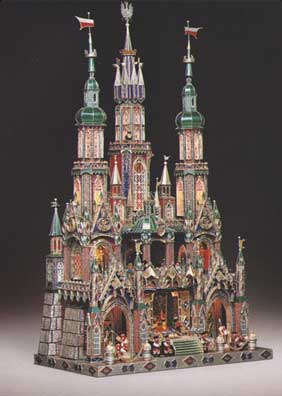
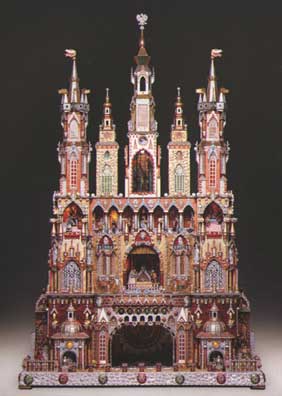
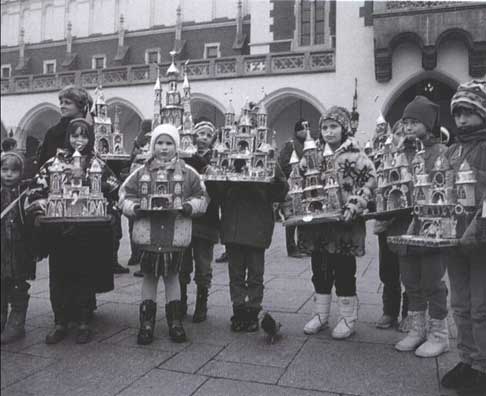
Traditional nativity scenes in Polish churches






Polish carols (mp3)
Bog siê rodzi
Do szopy hej pasterze
Dzisiaj w Betlejem
Oj maluski”
Gdy sliczna panna
Medrcy swiata
TOPICS: Culture/Society; Foreign Affairs
KEYWORDS: christmas; christmascustoms; merrychristmas; poland
Navigation: use the links below to view more comments.
first 1-20, 21-40, 41-47 next last
1
posted on
12/23/2006 7:49:05 AM PST
by
lizol
To: netmilsmom
2
posted on
12/23/2006 7:49:51 AM PST
by
Fierce Allegiance
(Merry Christmas! SAY NO TO RUDY!)
To: lizol
Wonderful - and pass the ham and kielbasy
3
posted on
12/23/2006 7:53:52 AM PST
by
spanalot
To: sidegunner; outofstyle; quesney; Brad's Gramma; OriginalChristian; Huber; Think free or die; ...

May Peace Hope and Love be with you Today, Tomorrow and Always
Merry Christmas from Lowicz (Poland), my FRiends!
4
posted on
12/23/2006 7:54:30 AM PST
by
lizol
(Liberal - a man with his mind open ... at both ends)
To: lizol
Wonderful pictures and traditions.
Merry Christmas to you!
To: lizol
6
posted on
12/23/2006 8:00:09 AM PST
by
hedgetrimmer
(I'm a millionaire thanks to the WTO and "free trade" system--Hu Jintao top 10 worst dictators)
To: lizol
Wesolych Swiat Bozego NarodzeniaThe pronunciation of the Polish alphabet is different than it is in English. CDo you know how I would pronounce this in English? Could you spell it phoenetically? I have Polish friends I'll see at Midnight Mass...I'd like to be able to greet them with a Polish Merry Christmas.
7
posted on
12/23/2006 8:01:27 AM PST
by
pgkdan
To: lizol
The Poles rock. I was the token non-Pole in a Catholic high school on Detroit's east side. We were praying for the success of the Dom Polski Revolution. At first I thought Dom Polski was a shortstop for the Phillies.
8
posted on
12/23/2006 8:02:05 AM PST
by
BW2221
To: lizol
9
posted on
12/23/2006 8:04:35 AM PST
by
Dante3
To: STARWISE; lizol
How nice!!!
Starwise, you must see this!!!!
10
posted on
12/23/2006 8:05:18 AM PST
by
onyx
(Phillip Rivers, LT and the San Diego Chargers! WOO-HOO!)
To: lizol
11
posted on
12/23/2006 8:05:23 AM PST
by
ElkGroveDan
(When toilet paper is a luxury, you have achieved communism.)
To: lizol
Thanks so much!
Merry Christmas!
To: lizol
To: lizol
Thanks for posting this.
Brings back great memories of the meals Grandma used to make. We still do the Oplatek, but I never could stand the sledzie, it still makes me shudder.
14
posted on
12/23/2006 8:09:54 AM PST
by
sharkhawk
(Play me a dirge matey)
To: lizol
This is great. Thanks! Of all the Europeans, I like the Poles the best. If they aren't absolutely the most wonderful, faithful, friendly people, I don't know who are. And their food is, well, sublime!
ΚΑΛΑ ΧΡΙΣΤΟΥΓΕΝΝΑ from a fellow "Eastern European"!
15
posted on
12/23/2006 8:10:19 AM PST
by
Kolokotronis
(Christ is Risen, and you, o death, are annihilated!)
To: lizol
Has anyone else noticed that countries that have kept their Christianity have resisted the infestation of the head-choppers? Poland and Greece are two examples.
Has anyone else noticed that countries that have abandoned Christianity for materialism have encouraged the infestation of the head-choppers? France, England, the United states are two examples.
To: lizol
Thank you for sharing this! What lovely traditions! Wesolych Swiat Bozego Narodzenia!
To: lizol
Wesolych Swiat Bozego Narodzenia, my FRiend.
18
posted on
12/23/2006 8:22:04 AM PST
by
NonValueAdded
(Prayers for our patriot brother, 68-69TonkinGulfYachtClub, now more than ever my FRiends.)
To: pgkdan
Could you spell it phoenetically? I have Polish friends I'll see at Midnight Mass...I'd like to be able to greet them with a Polish Merry Christmas. Veh-so-wikh Shvyant Bo-zheh-go Na-rod-zehn-yah. (The y in Shvyant, is y as in 'yes.' All of the o's are long o's, as in 'go'. )
19
posted on
12/23/2006 8:29:56 AM PST
by
dfwgator
To: lizol
20
posted on
12/23/2006 8:33:11 AM PST
by
varon
(Allegiance to the constitution, always. Allegiance to a political party, never.)
Navigation: use the links below to view more comments.
first 1-20, 21-40, 41-47 next last
Disclaimer:
Opinions posted on Free Republic are those of the individual
posters and do not necessarily represent the opinion of Free Republic or its
management. All materials posted herein are protected by copyright law and the
exemption for fair use of copyrighted works.
FreeRepublic.com is powered by software copyright 2000-2008 John Robinson




























